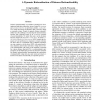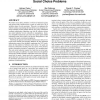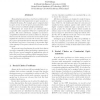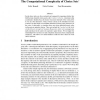130
click to vote
AAAI
2012
13 years 4 months ago
2012
Distance rationalizability is an intuitive paradigm for developing and studying voting rules: given a notion of consensus and a distance function on preference profiles, a ration...
120
click to vote
KER
2008
15 years 2 months ago
2008
Computational social choice is a new discipline currently emerging at the interface of social choice theory and computer science. It is concerned with the application of computati...
135
click to vote
DAGSTUHL
2007
15 years 3 months ago
2007
Computational social choice is an interdisciplinary
eld of study at the interface of social choice theory and computer science, with knowledge
owing in either direction. On the o...
111
click to vote
ATAL
2006
Springer
15 years 5 months ago
2006
Springer
We model social choice problems in which self interested agents with private utility functions have to agree on values for a set of variables subject to side constraints. The goal...
WEBI
2004
Springer
15 years 7 months ago
2004
Springer
Many situations present a social choice problem where different self-interested agents have to agree on joint, coordinated decisions. For example, power companies have to agree o...
112
click to vote
SIGECOM
2005
ACM
15 years 7 months ago
2005
ACM
This paper initiates research on the foundations of ranking systems, a fundamental ingredient of basic e-commerce and Internet Technologies. In order to understand the essence and...
108
click to vote
TARK
2007
Springer
15 years 8 months ago
2007
Springer
Social choice rules are often evaluated and compared by inquiring whether they fulfill certain desirable criteria such as the Condorcet criterion, which states that an alternativ...
116
click to vote
ATAL
2007
Springer
15 years 8 months ago
2007
Springer
Ranking systems are a fundamental ingredient of multi-agent environments and Internet Technologies. These settings can be viewed as social choice settings with two distinguished p...




